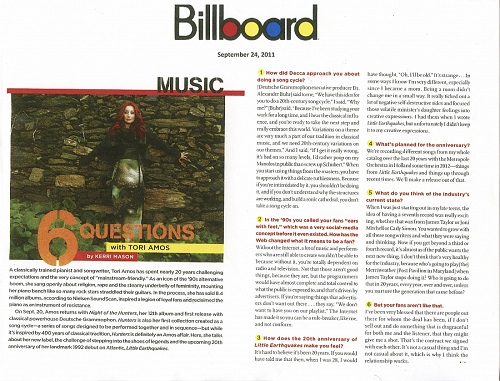|

songs | interviews | photos | tours | boots | press releases | timeline
Billboard (US)
September 24, 2011
6 Questions with Tori Amos
by Kerri Mason
A classically trained pianist and songwriter, Tori Amos has spent nearly 20 years challenging expectations and the very concept of "mainstream-friendly." As an icon of the '90s alternative boom, she sang openly about religion, rape and the steamy underbelly of femininity, mounting her piano bench like so many rock stars straddled their guitars. In the process, she has sold 8.4 million albums, according to Nielsen SoundScan, inspired a legion of loyal fans and reclaimed the piano as an instrument of resistance.
On Sept. 20, Amos returns with Night of Hunters, her 12th album and first release with classical powerhouse Deutsche Grammophon. Hunters is also her first collection created as a song cycle -- a series of songs designed to be performed together in sequence -- but while it's inspired by 400 years of classical tradition, Hunters is definitely an Amos affair. Here, she talks about her new label, the challenge of stepping into the shoes of legends and the upcoming 20th anniversary of her landmark 1992 debut on Atlantic, Little Earthquakes.
1 How did Decca approach you about doing a song cycle?
[Deutsche Grammaphon executive producer Dr. Alexander Buhr] said to me, "We have this idea for you to do a 20th-century song cycle." I said, "Why me?" [Buhr] said, "Because I've been studying your work for a long time, and I hear the classical influence, and you're ready to take the next step and really embrace this world. Variations on a theme are very much a part of our tradition in classical music, and we need 20th-century variations on our themes." And I said, "If I get it really wrong, it's bad on so many levels, I'd rather poop on my Manolos in public than screw up Schubert." When you start using things from the masters, you have to approach it with a delicate ruthlessness. Because if you're intimidated by it, you shouldn't be doing it, and it you don't understand why the structures are working, and build a sonic cathedral, you don't take a song cycle on.
2 In the '90s you called your fans "ears with feet," which was a very social-media concept before it even existed. How has the Web changed what it means to be a fan?
Without the Internet, a lot of music and performers who are still able to create wouldn't be able to because without it, you're totally dependent on radio and television. Not that those aren't good things, because they are, but the programmers would have almost complete and total control to what the public is exposed to, and that's driven by advertisers. If you're saying things that advertisers don't want out there . . . they say, "We don't want to have you on our playlist." The Internet has made it so you can be a rule-breaker, like me, and not conform.
3 How does the 20th anniversary of Little Earthquakes make you feel
It's hard to believe it's been 20 years. If you would have told me that then, when I was 28, I would have thought, "Oh, I'll be old." It's strange . . . In some ways I know I'm very different, especially since I became a mom. Being a mom didn't change me in a small way. It really ticked out a lot of negative self-destructive sides and focused those volatile minister's daughter feelings into creative expressions. I had them when I wrote Little Earthquakes, but unfortunately I didn't keep it to my creative expressions.
4 What's planned for the anniversary?
We're recording different songs from my whole catalog over the last 20 years with the Metropole Orchestra in Holland some time in 2012 -- things from Little Earthquakes and things up through recent times. We'll make a release out of that.
5 What do you think of the industry's current state?
When I was just starting out in my late teens, the idea of having a seventh record was really exciting, whether that was from James Taylor or Joni Mitchell or Carly Simon. You wanted to grow with all these songwriters and what they were saying and thinking. Now if you get beyond a third or fourth record, it's almost as if the public wants the next new thing. I don't think that's very healthy for the industry, because who's going to play [the] Merriweather [Post Pavilion in Maryland] when James Taylor stops doing it? Who is going to do that in 20 years, every year, over and over, unless you nurture the generation that came before?
6 But your fans aren't like that.
I've been very blessed that there are people out there for whom the deal has been, if I don't sell out and do something that is disgraceful for both me and the listener, that they might give me a shot. That's the contract we signed with each other. It's not a casual thing and I'm not casual about it, which is why I think the relationship works.
original article

t o r i p h o r i a
tori amos digital archive
yessaid.com
|